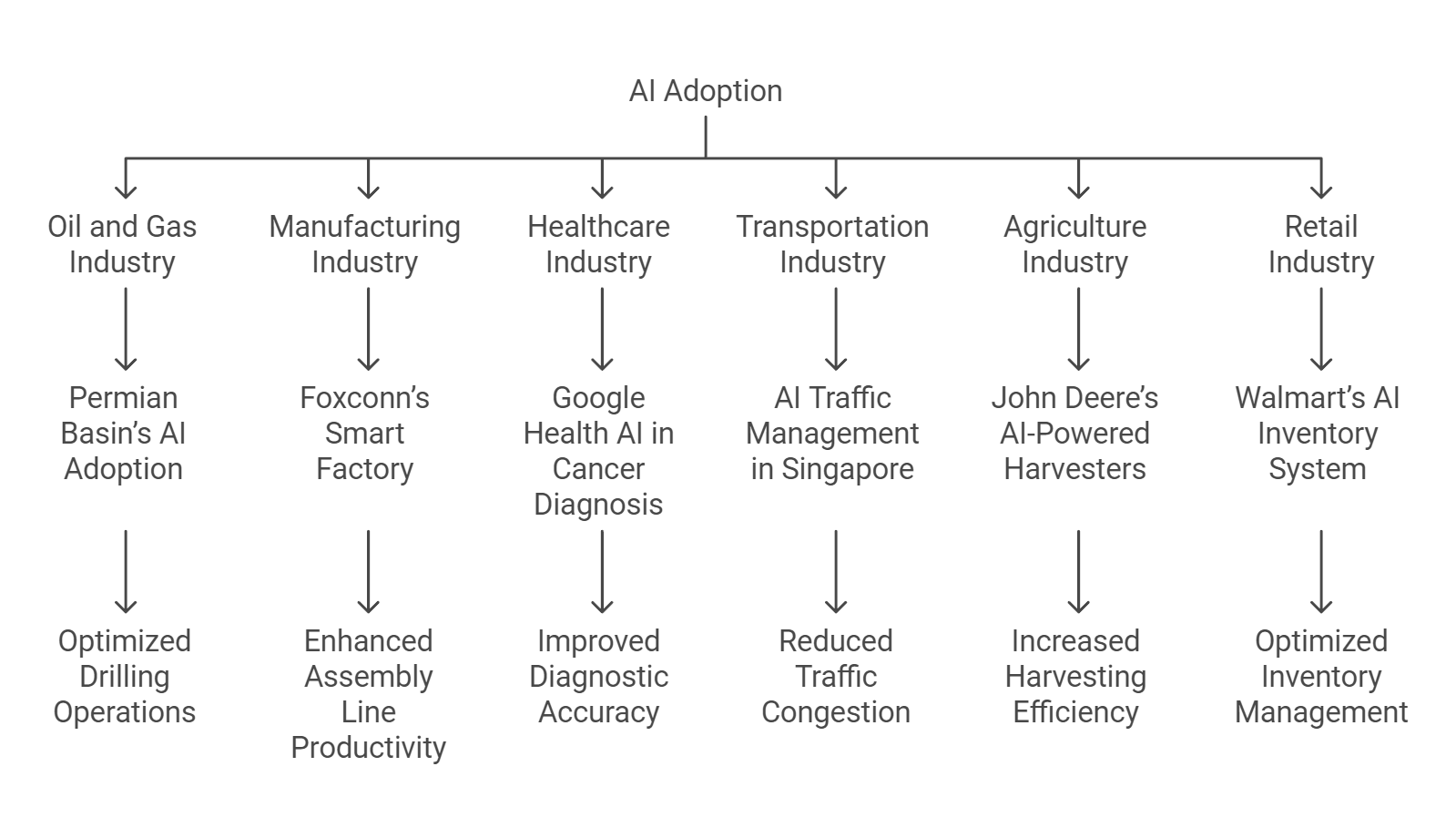
Artificial intelligence (AI) is increasingly being integrated into traditional industries, leading to significant transformations in operations, efficiency, and innovation.
1. Oil and Gas Industry:
Permian Basin’s AI Adoption
- What Happened: Oil producers in the Permian Basin, a major oil production region in the U.S., adopted AI tools to optimize drilling operations.
- AI Use Case:
- AI models analyzed geological and operational data to identify optimal drilling sites.
- Machine learning algorithms predicted equipment maintenance needs, reducing downtime.
- Remote control systems powered by AI allowed operations to be monitored and adjusted in real-time.
- Impact: Reduced break-even prices for oil extraction and increased operational efficiency, boosting overall profitability.
- Source: (Barron’s)
2. Manufacturing Industry:
Foxconn’s Smart Factory
- What Happened: Foxconn, a major electronics manufacturer, expanded its use of AI in production facilities in Shenzhen, China.
- AI Use Case:
- AI-powered collaborative robots (“cobots”) enhanced assembly line productivity by performing repetitive tasks and assisting human workers.
- AI-based quality control systems used computer vision to detect micro-defects in products in real-time.
- Impact: Reduced production errors by 30% and increased assembly line efficiency by 20%.
- Source: Industry-specific report on Foxconn AI integration.
3. Healthcare Industry:
Google Health AI in Cancer Diagnosis
- What Happened: Google Health launched an AI system to assist pathologists in identifying early-stage breast cancer from biopsies.
- AI Use Case:
- Deep learning algorithms analyzed pathology slides to detect anomalies.
- The system flagged suspicious areas for further human review.
- Impact: Improved diagnostic accuracy and reduced diagnosis times by 40%.
- Source: (Google Health Blog)
4. Transportation Industry:
AI Traffic Management in Singapore
- What Happened: The Singapore Land Transport Authority deployed an AI-based traffic management system.
- AI Use Case:
- Real-time AI algorithms processed video feeds from traffic cameras.
- The system optimized traffic signal timings based on live traffic data to reduce congestion.
- Impact: Traffic delays reduced by 25% during peak hours.
- Source: (Singapore LTA News)
5. Agriculture Industry:
John Deere’s AI-Powered Harvesters
- What Happened: John Deere introduced AI-powered autonomous harvesters in farms across the U.S.
- AI Use Case:
- AI systems optimized harvest routes and speeds to maximize crop collection efficiency.
- Computer vision detected crops and adjusted harvesting mechanisms in real-time.
- Impact: Increased harvesting efficiency by 15% and reduced crop loss by 10%.
- Source: (John Deere Newsroom)
6. Retail Industry:
Walmart’s AI Inventory System
- What Happened: Walmart expanded its AI-powered inventory management system across its U.S. stores.
- AI Use Case:
- AI analyzed real-time sales data and customer trends to optimize restocking schedules.
- Automated systems alerted staff to restock shelves or address inventory discrepancies.
- Impact: Reduced out-of-stock rates by 20% and improved customer satisfaction metrics.
- Source: (Walmart Corporate)
Challenges Across Industries:
- Data Integration: Many organizations face challenges in integrating legacy systems with AI solutions.
- Workforce Upskilling: Employees require training to work alongside AI-powered tools.
- Ethical Considerations: Industries must address concerns such as algorithmic bias and data privacy.
These examples demonstrate how AI is transforming industries, offering significant efficiency and profitability gains while highlighting the need for careful implementation strategies.







